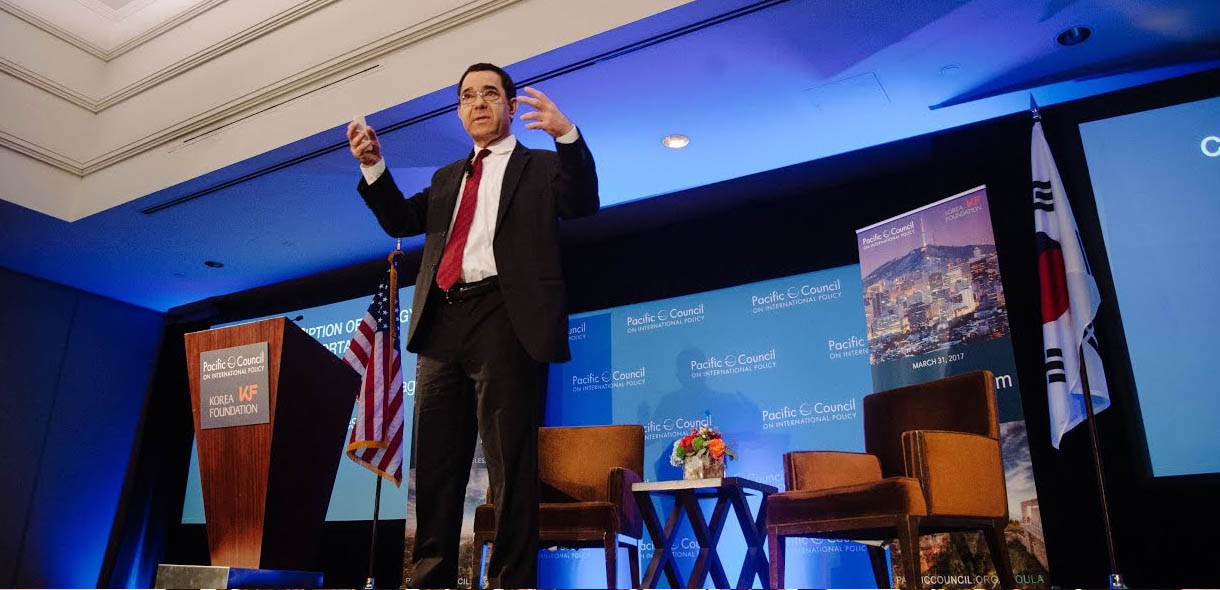
 Tony Seba addressing Pacific Council on Energy & Transportation
Tony Seba addressing Pacific Council on Energy & Transportation
Prepare to be Disrupted!
If you're in the energy business or the auto industry, Tony Seba has some bad news for you. Many of your companies are about to go the way of Kodak, Xerox, and Blockbuster. Blame it on the convergence of three key technological innovations: the iPhone, autonomous driving and electric cars.
Tony Seba, the co-founder of RethinkX and author of "Clean Disruption of Energy & Transportation" likes to point to a photograph of New York City in 1905. The scene is 5th Avenue in front of St. Patrick's cathedral. The sidewalks are jammed with bowler-hatted gents, while the street is packed with horse-drawn carriages. He notes that here is nary an automobile to be seen. Less than two decades on, and there are virtually no carriages in a street crammed with automobiles. That's the pace of technologic disruption. The difference, he points out always seems to be a factor of ten. A Ford Model T cost about the same as a carriage with two horses, but Mr. Ford's 'Tin Lizzy' internal combustion engine boasted the equivalent of 20 horses: 10 times that of the carriage. For Seba and co-author James Arbib, it's not a single technology that instigates major disruption, but the convergence of technologies and in the case of transportation, it's the coming together of electric vehicles, autonomous driving, and shared services. In their new 77-page study, "Rethinking Transportation 2020-2030," they see the evolution of Transportation as a Service (TaaS) resulting in a savings to consumers of a trillion dollars annually, but at the expense of jobs in manufacturing, sales, and service, and that's just the auto sector. The oil industry is going to see equal economic disruption as the world demand for oil peaks to 100 million barrels a day around 2020, then collapses to 70 million/day thereafter. This effectively drops the price of oil to less than $25 a barrel, making deepwater, tar sands and shale oil uncompetitive: companies and countries dependent on oil "rents" are going to hurt and that poses all sorts of political challenges going forward. For Seba, it's the economics that are compelling. By 2030, if not sooner, it simply won't make financial sense to even own a car, not when the annual effective cost per mile of ownership plummets from over a $1 to just 7¢. He foresees it becoming possible for TaaS to even be free at some point as corporate entities vey for your larger business. Using the example of Starbucks, the purveyor of premium coffee could someday operate a fleet of Apple-developed autonomous shuttles on which you can get your daily 'fix' of caffeine. With seven passengers on board, Seba calculates, it will cost Starbucks 1¢ a mile per passenger. And how much did you pay for that latte? You can listen to our 30-minute discussion using the embedded MP3 player below or download it to your computer for playback on your favorite MP3 device.
First Published: 2017-05-22
Pages Viewed: 23794

EV WORLD.COM
Future In Motion™ Podcast
Tony Ceba
The Complete MP3 File Is Available to Patron Supporters